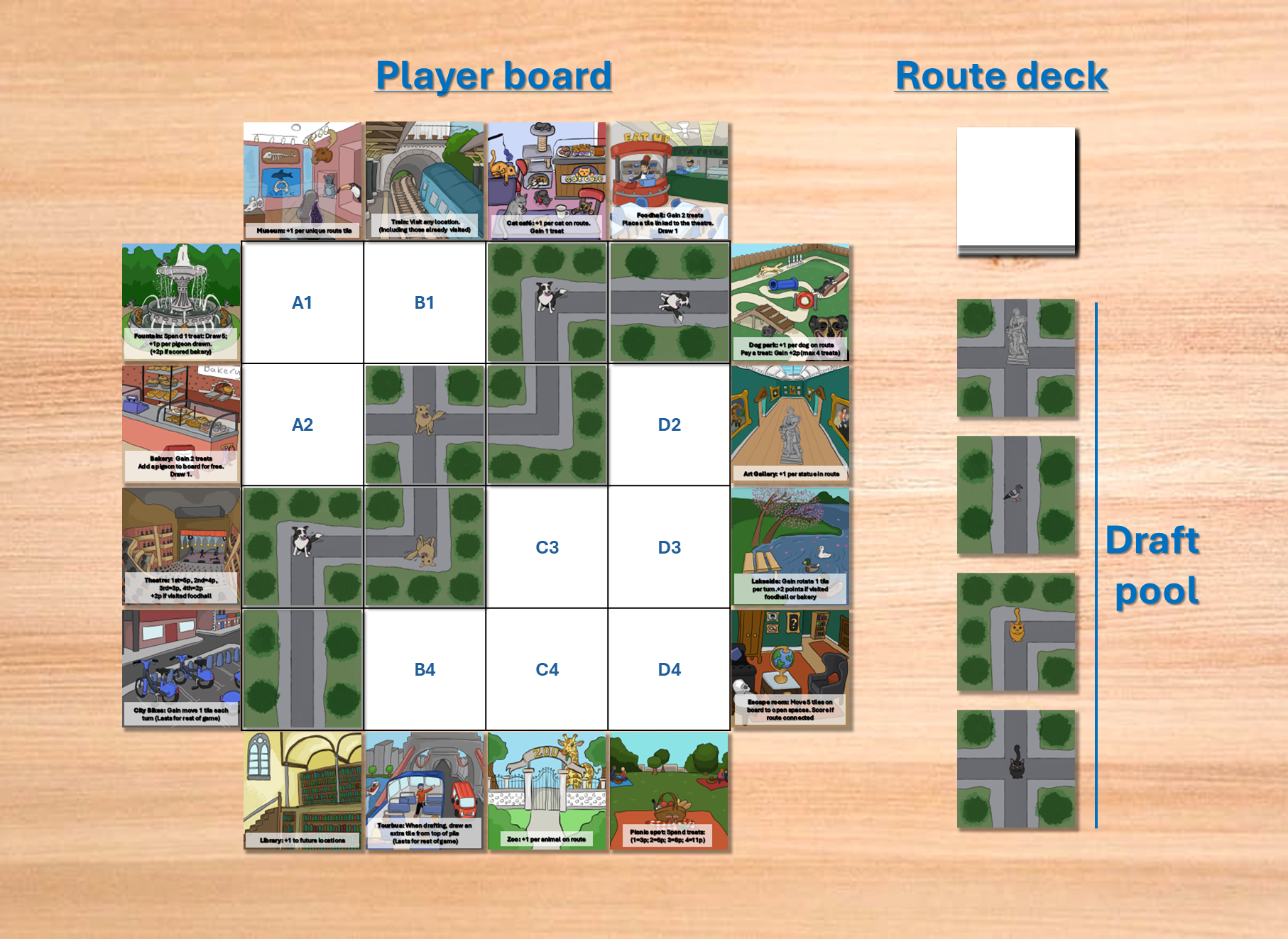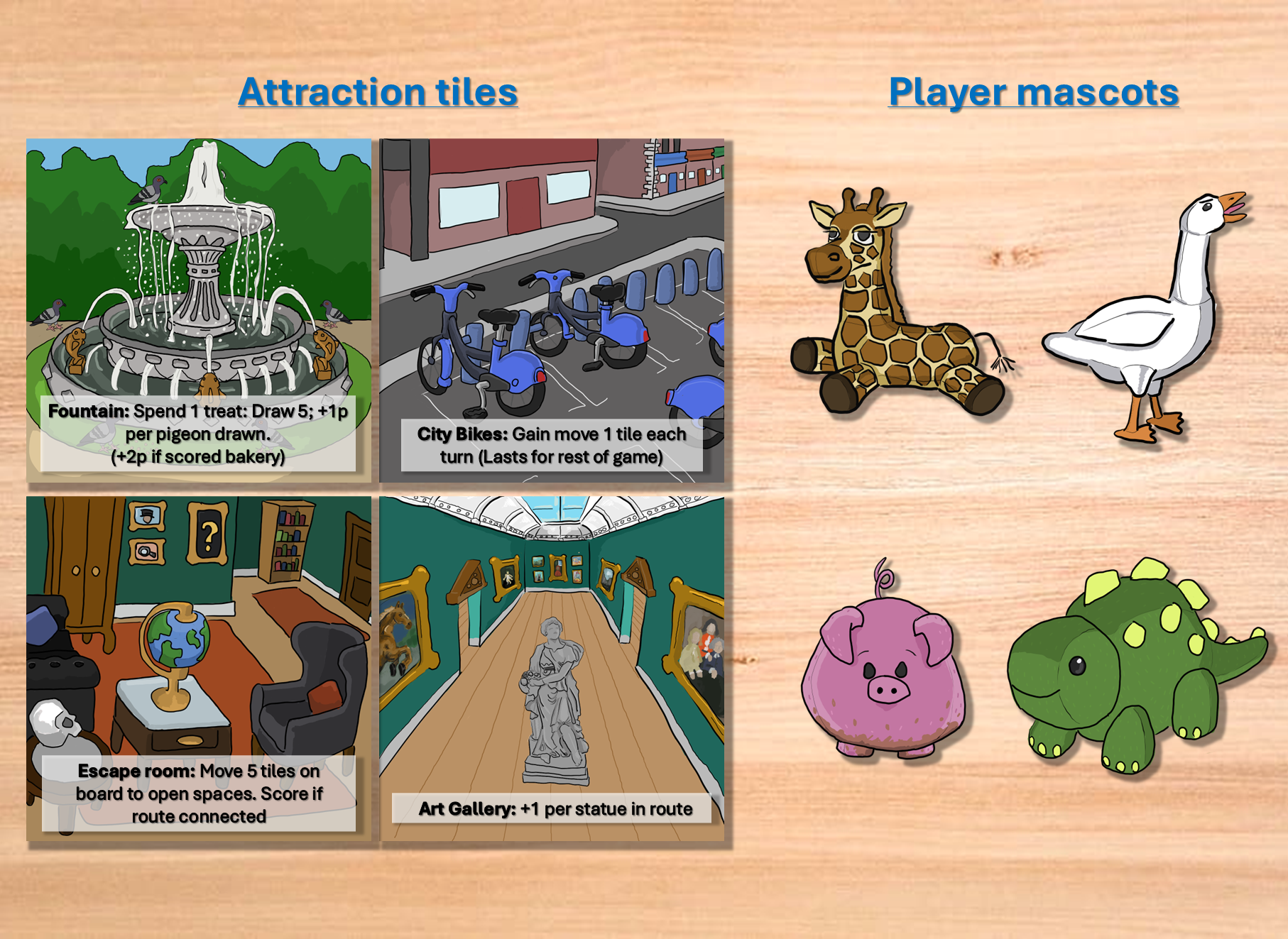af Ross Byrne

I Daytrip tager spillerne på en endagstur til en ny storby, hvor de skal forsøge at opleve så mange seværdigheder og så meget lækker mad som muligt for at have den bedste dag. Spillere vælger efter tur brikker og lægger dem i deres by-gitre for at forbinde og besøge attraktioner som “Zoo”, “Bageriet” og “Hundeparken”. Når en attraktion er forbundet, kan den omsættes til point efter unikke betingelser eller til særlige evner, der kan hjælpe spilleren senere i spillet.
Foromtale
- Tid: 60-90 min
- Spillere: 2 – 4
- Sprog: Engelsk
I Daytrip tager spillerne på udflugt til en ny storby og kappes om at besøge de 16 spændende attraktioner omkring spillernes by-gitre. Blandt disse attraktioner er klassiske turistattraktioner som “Museet” og “Teatret” samt skæve attraktioner som “Kattecaféen” og “Escape room’et”. Spillet spilles ved at placere og flytte “rutebrikker” (med veje) rundt på et personligt gitter for at danne ruter mellem attraktionerne og få point eller evner. Nogle rutebrikker viser bonusdyr eller -statuer, som du kommer forbi. Ruter omsættes til point efter deres længde, og nogle attraktioner har pointbetingelser, som giver bonuspoint, hvis du opfylder dem (f.eks. +1 point per kat på ruten til “Kattecaféen”). Andre attraktioner giver evner, der kan bruges i senere runder (f.eks. flytte brikker flere felter per runde med “Bycyklerne”), eller de giver dig ressurser som “godbidder”, der kan omsættes til point ved senere attraktioner (f.eks. +2 point per godbid i “Hundeparken”).
Spillets forløb er simpelt og underholdende. Hver runde vælger spillere efter tur en rutebrik til deres hånd. Derefter lægger alle spillere på samme tid en brik på det samme felt i deres respektive by-gitre. Det specifikke felt (f.eks. D4) vælges af den aktive spiller. Når brikkerne er placeret, kan spillerne vælge at flytte eller rotere én brik i deres gitter. Når du har forbundet to attraktioner med en sammenhængende vej af brikker, kan du vælge at besøge den ene og omsætte den til point/evner/resurser.
Kerneudfordringen i spillet er at beslutte i hvilken rækkefølge, du besøger hvilke attraktioner for at opnå dit mål om en god dag (dvs. opnå 60 point). Vil du gå efter at komme hurtigt foran og besøge attraktioner med mange point, som “Teatret”, der giver flere point til tidlige besøgende, eller vil du investere i senere runder og besøge attraktioner, der giver evner, som “Bycyklerne” (flyt flere brikker) eller “Søen” (rotér flere brikker). Vil du bygge korte ruter for at besøge mange attraktioner hurtigt eller lange ruter, der kan indkassere bonuspoint (f.eks. +1 point per dyr på ruten til “Zoo”). Der er mange mulige strategier til at vinde, og da det er tilfældigt hvert spil, hvor langs dit gitter, attraktionerne er placeret, er hver omgang af Daytrip forskellig.


Om designerne

Til daglig er Ross forsker, men han har elsket at spille bræt- og rollespil lige så længe, han kan huske. På gymnasiet tilbragte han utallige aftener og weekender med at spille skak, og på universitetet opdagede han så mere moderne brætspil, da han blev introduceret til moderne klassikere såsom Carcassonne, Betrayal og Pandemic. Han er fan af både strategi- og samarbejdsspil, og han er vild med spil, der har en stærk historie. Dette Fastaval bliver Ross’ første både som deltager og som designer, og han glæder sig til at prøve så mange nye spændende spil som muligt. Han håber, at du vil have det lige så sjovt med at spille Daytrip, som han havde det med at designe det.

Kasper har spillet brætspil i mere end 40 år. Uddannelsen indenfor informationsvidenskab fordrer, at han elsker at dekonstruere spil for at undersøge hvad der gør spillet større end summen af dets dele. Kasper foretrækker strategispil med historiske træk og tydelig inkorporeret tematik. Hans første Fastaval brætspilsdesign ”Witch Hunt” vandt en Otto for bedste brætspil og blev udgivet som “Pagan: Fate of Roanoke” i 2021.



